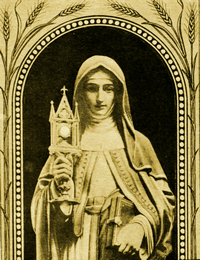Lives of the Saints
Our Models and Protectors
Spiritual Bouquet:
"My flesh is food indeed, and My blood is drink indeed."
St. John 6:56
April 7

Saint Juliana
of Mt. Cornillon
Virgin
(1193-1258)
Saint Juliana was born near Liege, Belgium in 1193. At the age of five she lost her parents and was placed in the convent of Mt. Cornillon near Liege. She made rapid progress in virtue, and read with pleasure the writings of Saint Augustine and Saint Bernard. She also cultivated an ardent love of the Blessed Virgin and the Sacred Passion, but especially of the Blessed Sacrament of the Altar. In 1206 she received the veil and devoted herself to the sick in the hospital associated with the convent.
Taught in repeated visions that Our Lord wanted a feast in honor of the institution of the most precious heritage of the Eucharist, after twenty years in which her humility protested the investiture of such a mission, she addressed herself to many dignitaries to obtain their opinion. The unanimous decision was that nothing in the divine law was opposed to the establishment of a special feast in honor of the Blessed Sacrament.
But soon opposition arose to her proposed feast of Corpus Christi. Although in 1230 she was chosen as Superior of her community, she was accused of being a visionary, and she became the object of harsh persecution by a man who had secured his position as overlord of the community by intrigues and bribery. He aroused the neighboring populations against her, and she was obliged to leave the region. Later she was vindicated in the courts through the influence of the Bishop of Liege; her persecutor was deposed, and she was restored to her position in the community.
In 1246 the same bishop ordered that the Feast of the Blessed Sacrament be celebrated every year on the Thursday after the octave of the Trinity. Nonetheless, after the death of the worthy bishop, the furious persecutor was reinstated in 1247 and succeeded once more in driving out the Saint. She passed the last years of her life in seclusion at Namur, and was buried in 1258 at Villiers.
It was Pope Urban IV, formerly archdeacon at Liege, who in 1264, formally instituted this feast day for the entire Church; it was he also who had commissioned Saint Thomas Aquinas to prepare the magnificent text of the Office and Mass. The Pope wrote to the friend and associate of Saint Juliana, a Sister-recluse who had continued her efforts to obtain the request of the Lord: May this day bring to all Christians the joy of a new feast and be celebrated with great joy, as We recommend fully in the Apostolic Letter We are sending to the entire world. In 1312 the Council of Vienna confirmed the papal bull, and from that time on, the feast day became general.
Reflection. Saint Juliana never ceased to hope in the help of God amid the most cruel persecutions. In effect, His clearly expressed Will was accomplished only after her death. Let us learn from her patience to practice the holy virtue of hope, and to rely on the divine aid for all that is pleasing to Him.
The Catholic Encyclopedia, edited by C. G. Herbermann with numerous collaborators (Appleton Company: New York, 1908); Les Petits Bollandistes: Vies des Saints, by Msgr. Paul Guérin (Bloud et Barral: Paris, 1882), Vol. 4